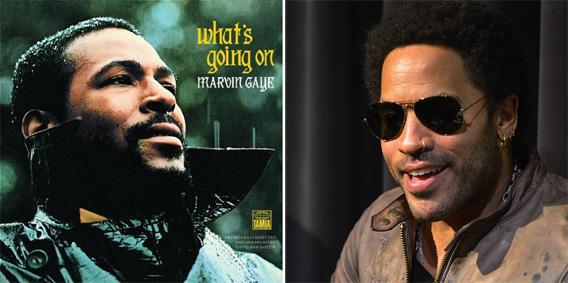Rocker-turned-actor Lenny Kravitz is set to play Marvin Gaye in an upcoming biopic about the time the Motown singer spent in Europe in the early 1980s. Kravitz, who until now has had supporting roles—as in Precious and The Hunger Games—has prompted criticism from some not for his acting inexperience, though, but because he is not “dark enough” to play Gaye. (Jesse L. Martin, who resembles Gaye far more than Kravitz and has both the acting and singing chops to boot—he was in the original Broadway cast of Rent—was supposed to play the singer in another project, but that one has stalled.)
This is only the latest accusation of Hollywood’s “colorism,” as seen with the controversy surrounding actress Zoe Saldana. The casting of Saldana—a self-identifying black Latina actress—in the upcoming biopic of singer Nina Simone stirred up serious controversy, prompting articles in the New York Times and elsewhere. Simone’s own daughter cited her mother’s dark complexion and distinct facial features as being an irrefutable part of her career and image, one that did not correspond with the casting of Saldana. “My mother was raised at a time when she was told her nose was too wide, her skin was too dark,” she said. Simone’s physical attributes were indeed integral to her personal and artistic struggles—and images from the set of a heavily made-up Saldana have reinforced the doubts about her casting—but is that really true of Gaye as well?
Colorism is a real thing, in Hollywood and in the black community, but the casting of Kravitz is not an example of such prejudices. Gaye’s career and personal struggles were not intertwined with the particular complexion of his skin in the same way that Simone’s were, and it is not crucial to the storytelling that the actor be darker-skinned or have more “African” features.
What’s more, Kravitz’s skills as a musician could be an asset to his portrayal, while Saldana has not displayed musical abilities in her previous projects. And stranger casting choices than Kravitz have proven successful before; who would have thought the same guy who got his big break in low-brow comedy on In Living Color could pull off Ray Charles?
That Kravitz’s complexion should not be an issue does speak to another double standard, though: the one used for men and women. Hollywood and the music industry have long been more accepting of dark-skinned men than they have of dark-skinned women. Consider the careers of Denzel Washington and Don Cheadle, for instance, and contrast them with those of Viola Davis and Angela Bassett, who have not been given nearly the same opportunities as fairer-skinned women like Saldana and Halle Berry, despite their superior talent.
Is the biracial Kravitz lighter than Gaye? Sure. But what’s going on here has more to do with the potential box office draw of a famous—albeit fairly unproven—name, rather than Hollywood’s preference for “light” over “dark.”
